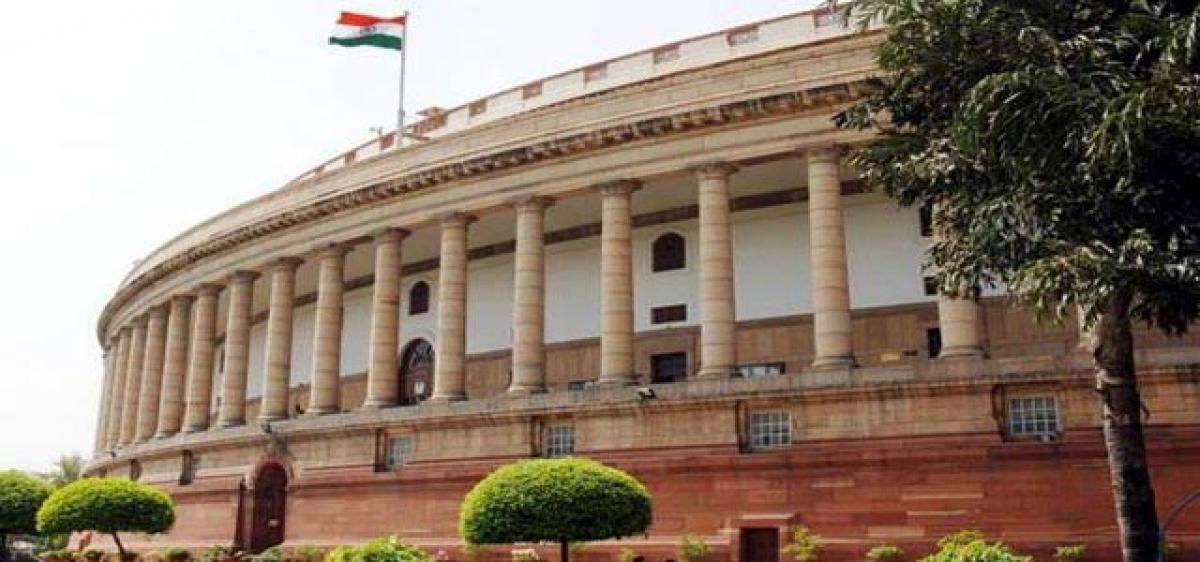Live
- Layering With Essentials Hoodie for Cozy and Chic Outfits
- Chanchalguda Jail Officials Say They Haven't Received Bail Papers Yet, Allu Arjun May Stay in Jail Tonight
- BJP leaders present evidence of illegal voters in Delhi, urge EC for swift action
- Exams will not be cancelled: BPSC chairman
- Nagesh Trophy: Karnataka, T.N win in Group A; Bihar, Rajasthan triumph in Group B
- YS Jagan condemns the arrest of Allu Arjun
- Economic and digital corridors to maritime connectivity, India and Italy building vision for future, says Italian Ambassador
- SMAT 2024: Patidar's heroics guide Madhya Pradesh to final after 13 years
- CCPA issues notices to 17 entities for violating direct selling rules
- Mamata expresses satisfaction over speedy conviction in minor girl rape-murder case
Just In

It takes an average of 261 days for a parliamentary law to come into force, according to a report by Vidhi Centre for Legal Policy, a think-tank.
It takes an average of 261 days for a parliamentary law to come into force, according to a report by Vidhi Centre for Legal Policy, a think-tank. The report analysed 44 laws enacted by Parliament between 2006 and 2015 and calculated the average number of days between a law receiving presidential assent and coming into force. More than half of the laws analysed entered into force within six months.
After receiving presidential assent, implementation of the law requires two more steps. First, the government must bring it into force through notification in the Official Gazette. The second step which is not essential but integral to the practical working of the law is the framing of rules.
Most laws require rules in accordance with the law for its implementation approved by the legislature, before they are presented to each house of parliament.
"Most members of Parliament (MPs) are unaware of how long it takes for rules to be framed for bringing a law into force," Shashi Tharoor, MP from Thiruvananthapuram, said in an email interview to IndiaSpend. "Though the rules are supposed to be tabled in Parliament, they are almost never discussed. So, they pass by unnoticed among the welter of other papers laid on the table by ministers."
"The public sees from media reporting that a law has been passed or changed, and naturally expects that what they have read in the newspapers is the new reality. It is wrong to keep them waiting for 261 days to adjust to what they are told is the law of the land," Tharoor said.
The Black Money (Undisclosed Foreign Income and Assets) and Imposition of Tax Act 2015 took 311 days (more than 10 months) to get implemented. The Bill was passed by the Lok Sabha on 11th May, 2015 and the Rajya Sabha on 13th May, 2015.
As many as 644 declarations of undisclosed foreign income and assets were received under this act, and Rs 2,428 crore was collected in taxes. Ninety per cent of the collection came from five per cent of declarations, according to reports.
Another important bill, the Aadhaar (Targeted Delivery of Financial and Other Subsidies, Benefits and Services) Act, 2016, was passed in the budget session of the Parliament (in March 2016) but the notification of its provisions began only in September after the Unique Identification Authority of India (UIDAI) received statutory backing and the regulations under the Act were notified.
The UIDAI was constituted in 2009 but that was through an executive notification issued by the erstwhile Planning Commission. It received statutory backing after the Aadhaar Act, 2016, was enacted.
The bill was introduced as a money bill by the Bharatiya Janata Party (BJP), which generated outrage among the opposition parties. A money bill can only be introduced in the Lok Sabha, or the lower house. The Rajya Sabha, or the upper house, can recommend changes to a money bill. However, these aren't binding and, if the lower house rejects the suggestion, the bill is automatically passed.
Supreme Court judge Madan B. Lokur had criticised the government in March 2016 for delaying the implementation of the Juvenile Justice Act 2015. The Manual of Parliamentary Procedure in India has recommended a time limit of 15 days for framing rules, after publication of approval in the official gazette.
Such rules are called subordinate legislation and may be referred to as rules, regulations, bye-laws, orders, and notification. However, only 34 per cent (15 of 44 laws analysed) adhered to the time limit, while 49 per cent of laws took 15-60 days in the Lok Sabha and 56 per cent in the Rajya Sabha.(In arrangement with IndiaSpend.org)
By Devanik Saha

© 2024 Hyderabad Media House Limited/The Hans India. All rights reserved. Powered by hocalwire.com







